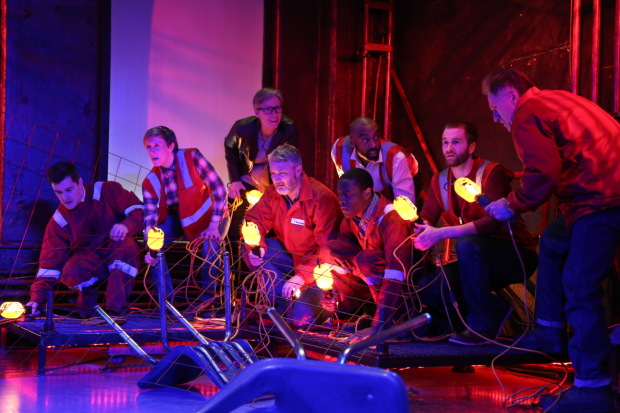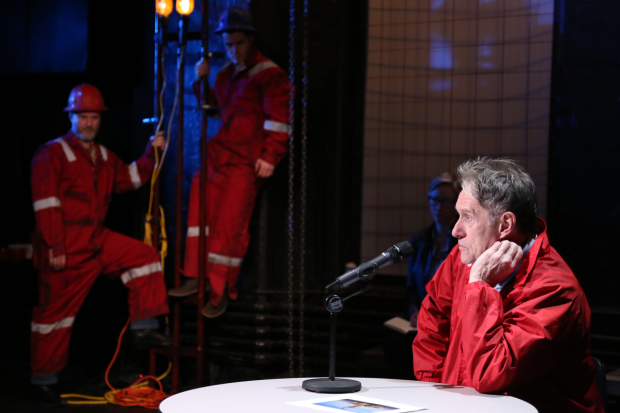Spill

(© Gerry Goodstein)
On April 20, 2010 — two days before Earth Day — an oil rig exploded in the Gulf of Mexico, causing the biggest environmental disaster in U.S. history. Leigh Fondakowski's Spill, now playing at Ensemble Studio Theatre, is a postmortem on the accident, a requiem for the 11 rig workers who died in it, and (in part) a reenactment of what happened. That's a lot for one play, and at times, audience members may find themselves swimming in information.
Granted, the circumstances of the explosion are complex. In 2001, British Petroleum, a multinational oil and gas company, hired the Deepwater Horizon rig to drill for oil in the Gulf of Mexico. For nine years, the Deepwater rig had been operating impressively (setting the record for the world's deepest well just months before it exploded) and safely. In fact, the day of the disaster, BP executives visited the rig to congratulate its crew on going seven years without an accident.
However, this commendable track record masked a history of taking ever-increasing risks to find oil. The date of the executives' visit was also when years of bad decisions literally blew up in everyone's face. That night, oil and gas surged up through the Deepwater's drill pipe, igniting a conflagration that left the rig burning for two days. A crew member later said in court that even "the water was on fire." So were the pants of the BP personnel who had lauded the Deepwater as a model of safety.

(© Gerry Goodstein)
Spill takes a documentary approach to its explosive subject, much like The Laramie Project did with the murder of Matthew Shepard. In fact, Fondakowski, Spill's writer and director, was The Laramie Project's head writer. This time around, she has collected material not only from interviews but also courtroom testimony and media accounts. While the effort to include a variety of perspectives is admirable, the result is a bit too much information. Courtroom testimony ranges from the rig's manager to the CEO of BP. Family members of dead rig workers describe the husbands and sons they lost. Alternating with these accounts are dramatizations of what happened before, during, and after the explosion. Although the descriptions are intermittently devastating ("My son was cremated alive," says the father of a rig worker) and the explosion's reenactment is powerful, the overgenerous documentation weighs down the drama.
Exacerbating the script's excess is the shortage of actors relative to the number of roles. The company of eight are all competent performers, but more than competence is needed when playing multiple parts. Changes in voice, for example, help but don't fully differentiate the narrator, an oil industry professional, and a spill-cleanup worker, all portrayed by the same woman. The fact that the actors occasionally step on one another's lines only muddies the waters more.
The technical elements of the production are a mix of good and could-be-better. One of the most striking is the video design by David Bengali. Screen panels line the back of the stage like windows, and through them, after the rig explodes, viewers see oil billowing up from the seafloor like chimney smoke. Sarah Lambert's set, aided by Fondakowski's inventiveness as a director, serves its various purposes. At one point, post-explosion, extension cords from the rig become the oil spill itself, seeping across the blue surface of the stage. Suzanne Chesney's costumes, however, exhibit a problem similar to the multiple casting. While the costumes are in themselves serviceable, they're not varied enough to differentiate all the people they're meant to.
Despite such shortcomings, Spill still gets across a sense of the human lives upended by the Deepwater disaster. "I just want people to make the connection," exclaims a former rig worker, ripping into consumers who complain about gas prices. "There are people's lives on the other end of that pump." Fondakowski wants people to make that connection too. Perhaps that's why she's freighted her play with so many characters and details. Unwieldy as the delivery mechanism is, her message about valuing people over money hits home — especially when you're living in a country where an interstate oil pipeline under construction may harm those living in its path.











